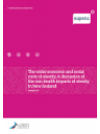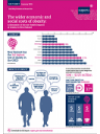This report highlights the impact obesity has on our economic, social, cultural and environmental well-being. At an individual and family level it can affect our income levels, educational achievement, self-esteem and social participation. As a society it affects how our taxes are used in government subsidies and even infrastructure.
The report also sets out some areas of focus for the future so we can inform policy decisions. The issue of obesity in New Zealand suffers from too much uncertainty and lack of research at this stage so future work on obesity must be targeted at:
• identifying the issues by estimating the wider cost of obesity for New Zealand
• assessing the intervention opportunities and proposing solutions.
Purpose
NZIER has surveyed the literature on the wider/non-health impacts of obesity and summarised the costs arising from them.
Obesity has adverse impacts on a population’s economic and social functioning. These impacts can be debilitating, restrict individuals’ activities and cause heightened risk of a range of health effects from which other consequences flow.
Studies in various countries have attempted to quantify the effects of obesity in economic terms. Many of these focus on the direct costs to the community of diagnosis and treatment of obesity, including medical services, hospital-related costs and personal healthcare costs (such as medication).
There are also non-health costs resulting from obesity. Non-health costs have received less attention in the research literature than the direct medical-related costs, particularly in New Zealand.
This report examines the evidence for non-health impacts from the international literature and considers their applicability to New Zealand.
The intention is not to develop a definitive estimate of these non-direct costs for New Zealand, but to infer from available evidence how large the different impacts might be in the New Zealand context.
The aim is to guide future efforts in researching knowledge gaps and prioritising new policy initiatives towards areas where they could alleviate the greatest economic costs.


